Unit 6 Do you like bananas? Section A 课时课件(共29张PPT)人教版英语七年级上册
文档属性
| 名称 | Unit 6 Do you like bananas? Section A 课时课件(共29张PPT)人教版英语七年级上册 | 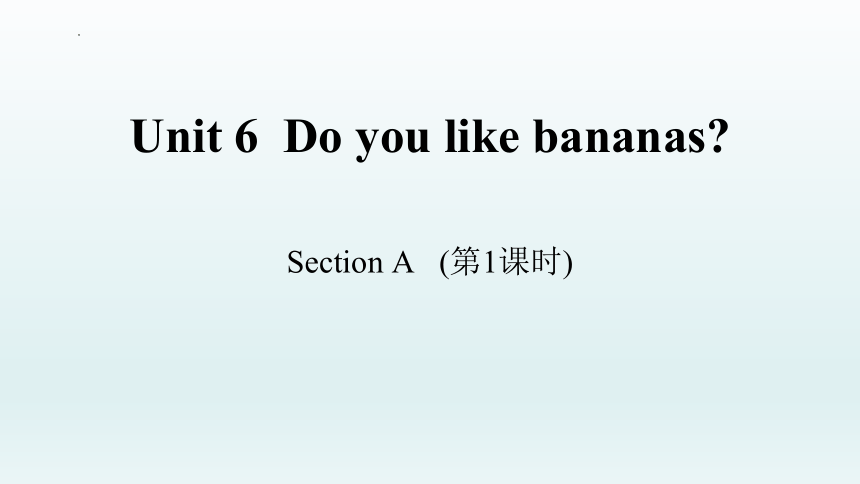 | |
| 格式 | pptx | ||
| 文件大小 | 1.7MB | ||
| 资源类型 | 教案 | ||
| 版本资源 | 人教新目标(Go for it)版 | ||
| 科目 | 英语 | ||
| 更新时间 | 2023-12-12 23:14:07 | ||
图片预览

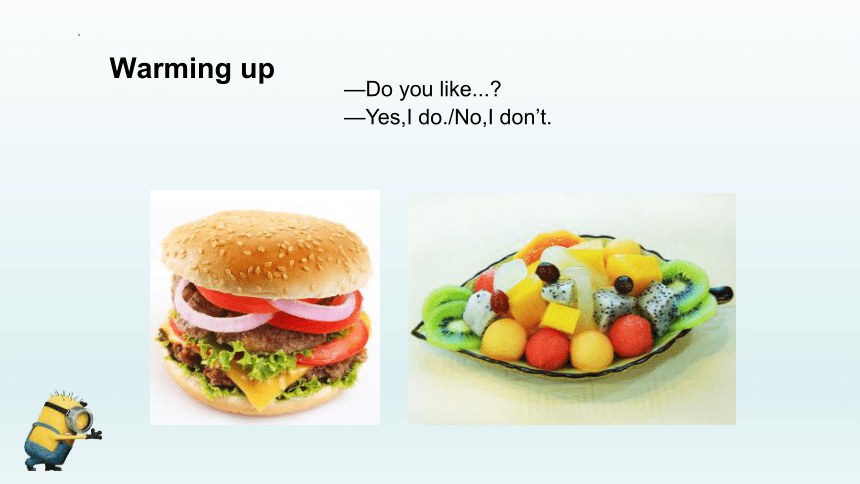
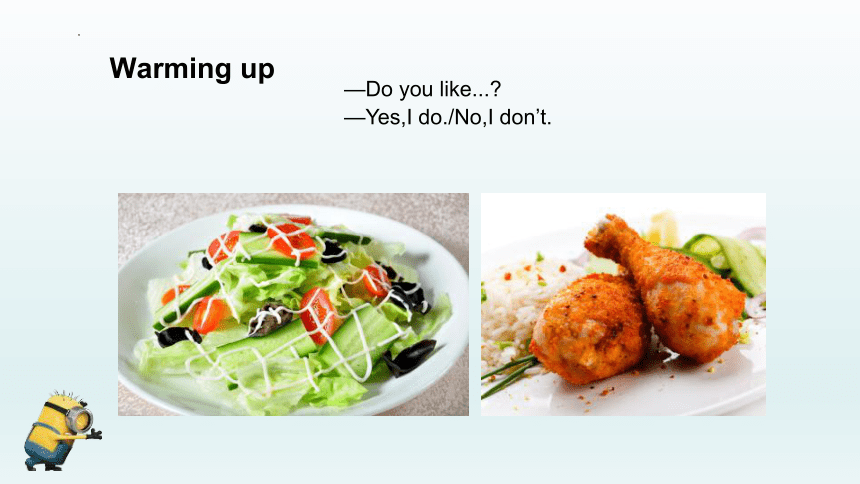
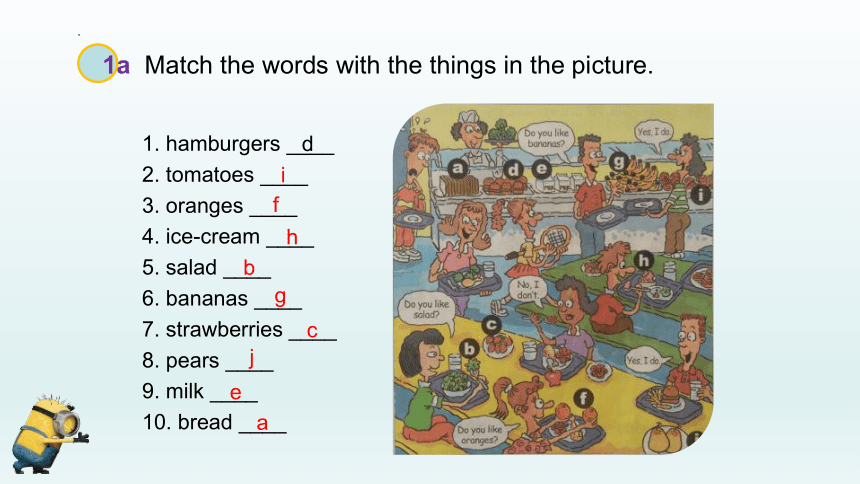
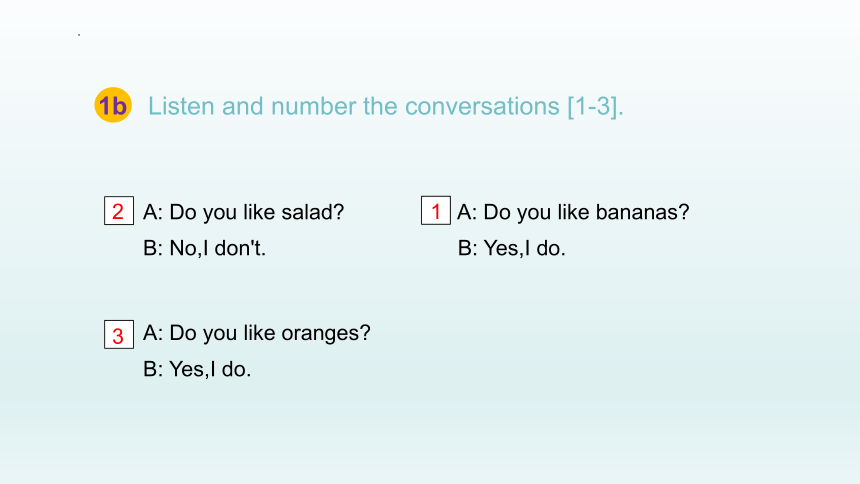
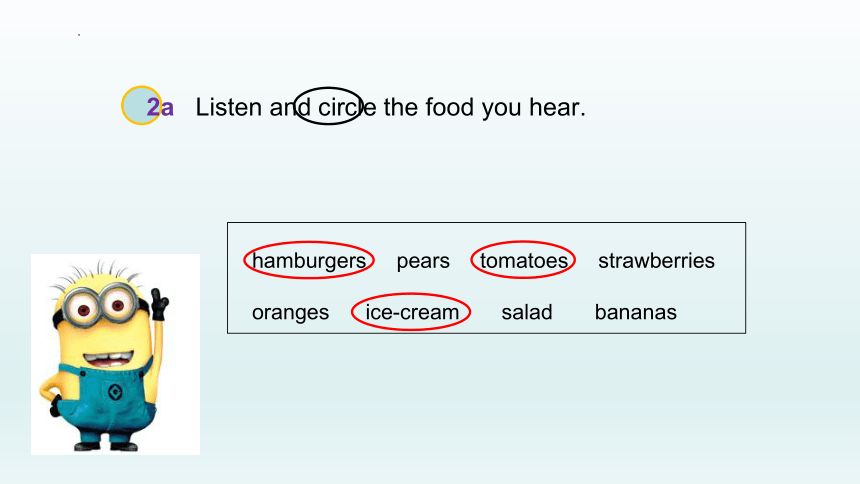
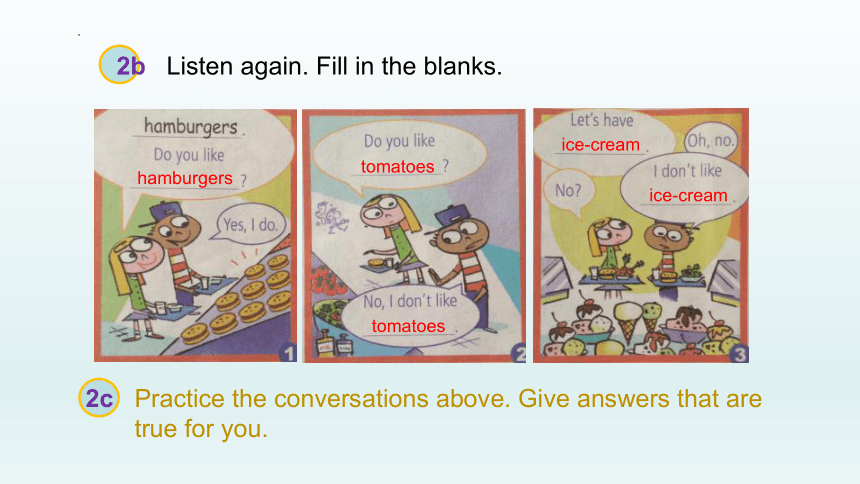
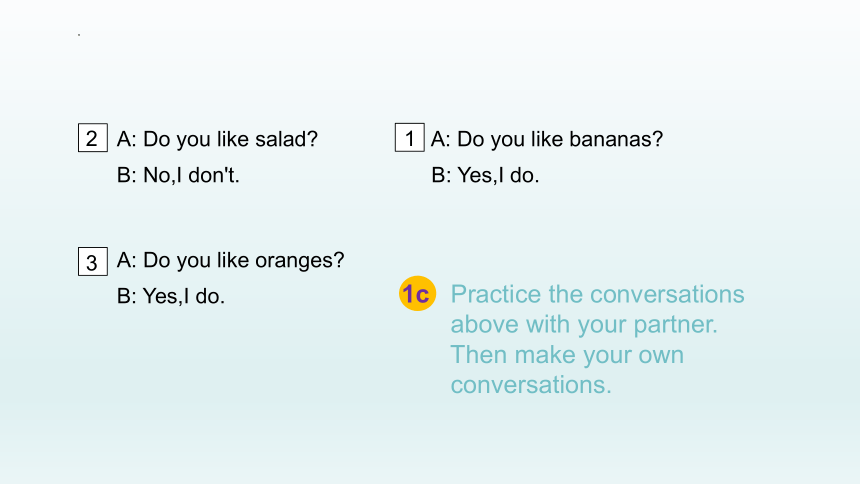
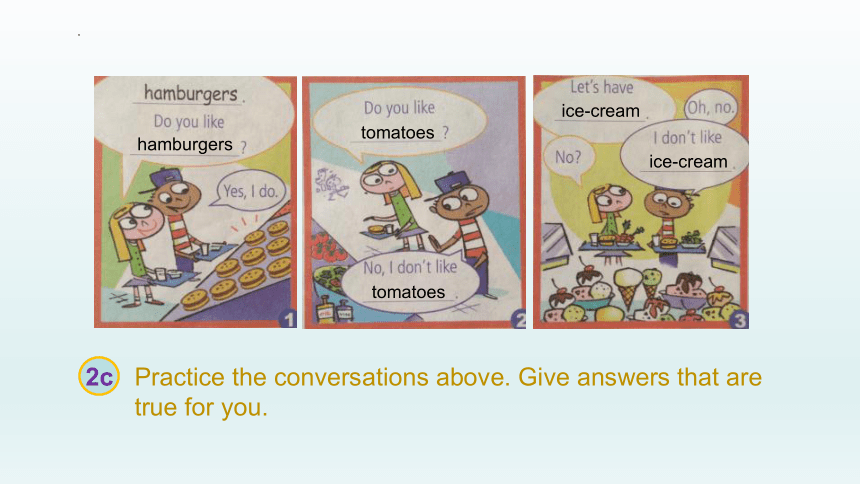
文档简介
(共29张PPT)
Unit 6 Do you like bananas
Section A (第1课时)
Warming up
—Do you like...
—Yes,I do./No,I don’t.
Warming up
—Do you like...
—Yes,I do./No,I don’t.
1a Match the words with the things in the picture.
1. hamburgers ____
2. tomatoes ____
3. oranges ____
4. ice-cream ____
5. salad ____
6. bananas ____
7. strawberries ____
8. pears ____
9. milk ____
10. bread ____
d
i
f
h
b
g
c
j
e
a
1b Listen and number the conversations [1-3].
A: Do you like salad A: Do you like bananas
B: No,I don't. B: Yes,I do.
A: Do you like oranges
B: Yes,I do.
2
1
3
2a Listen and circle the food you hear.
hamburgers pears tomatoes strawberries
oranges ice-cream salad bananas
2b Listen again. Fill in the blanks.
2c Practice the conversations above. Give answers that are
true for you.
hamburgers
tomatoes
tomatoes
ice-cream
ice-cream
A: Do you like salad A: Do you like bananas
B: No,I don't. B: Yes,I do.
A: Do you like oranges
B: Yes,I do.
1c Practice the conversations
above with your partner.
Then make your own
conversations.
2
1
3
2c Practice the conversations above. Give answers that are
true for you.
hamburgers
tomatoes
tomatoes
ice-cream
ice-cream
2d Role-play the conversation.
Jack: Hey, John's birthday dinner is next week.
Let's think about the food.
Tom: Sure. How about burgers, vegetable salad,
and some fruit
Bill: Sounds good. John likes hamburgers.
Jack: Oh, I don't like salad.
Bill: But John likes salad, and it's his birthday.
Jack: Yes, you're right. What about the fruit
Tom: I think John likes strawberries and apples.
Bill: OK. Let's have strawberries and apples then.
Language points
1.food食品,食物
通常情况下作不可数名词。但当表示特定种类的食品时,可作可数名词,其复数形式为foods。
sea food海鲜 frozen food冷冻食品
2.chicken鸡肉
名词,作不可数名词,意为“鸡肉”;作可数名词意为“鸡,小鸡”。
I have chicken for lunch.午餐我吃鸡肉。
3.tomato西红柿
tomato是可数名词,意为“西红柿”,其复数形式是在词尾加-es。
He doesn't like tomatoes or carrots.
【拓展】以-o结尾的名词的复数
(1)有生命意义的名词加-es,如heroes(英雄),potatoes(土豆)。
(2)无生命意义的名词加-s,如pianos(钢琴),photos(照片)。
4.Do you like bananas 你喜欢香蕉吗?(教材第31页)
(1)我们常用“Do/Does...like... ”句型来询问某人的喜好。肯定回答一般为:Yes,...do/does.,否定回答为:No,...don't/doesn't.。
(2)like是及物动词,它的用法有三种:
①like sb./sth.喜欢某人/某物,动宾结构,宾语是名词或代词。
②like to do sth.喜欢做某事
He likes to swim.
③like doing sth.喜欢做某事(比like to do sth.程度深)
I like learning English.
Exercise
一、单项选择。
1.—Do they like these books —No,they ________.
A.doesn't B.don't C.do D.aren't
2.—________ these your photos
—Yes.________ you like ________
A.Do;Do;them B.Are;Do;them
C.Are;Are;it D.Do;Are;them
3.Bob ________ oranges,but Bill ________ them.
A.like;don't like B.like;doesn't like C.likes;doesn't like
4.Mary and Gina don't like ________.
A.bread B.a bread C.breads
5.—________ he like pens —Yes,he ________.
A.Is;is B.Does;is C.Does;does D.Is;does
B
B
C
A
C
二、句型转换。
1.I like salad. (改为一般疑问句)
________ ________ like salad
2.—Do you like tomatoes (作肯定回答)
—________,I ________.
3.—Do you like milk (作否定回答)
—________,I ________.
4.I like hamburgers.(改为否定句)
I ________ ________ hamburgers.
5.It's a strawberry.(改为复数句)
________ ________ strawberries.
Do you
Yes do
No don't
don't like
They are
Homework
1.Recite all the new words.
2.Make a survey on your family members' likes and
dislikes about the food.
Thank you!
Unit 6 Do you like bananas
Section A (第2课时)
Warming up
—Do you like...
—Yes,I do./No,I don’t.
—Does she/he like...
—Yes,she/he does./No,she/he doesn’t.
香 蕉
汉堡包
草 莓
西红柿
冰激凌
沙 拉
梨
牛 奶
面 包
蔬 菜
水 果
Look at the flashing card and make conversations.
Do you like salad Yes, I do. / No, I don't.
Do they like pears Yes, they do/No, they don't.
Does she like tomatoes Yes, she does/No, she doesn't.
I like oranges. I don't like bananas.
We like rice. We don't like hamburgers.
He likes ice-cream. He doesn't like vegetables.
Countable nouns Uncountable nouns Countable and
Uncountable nouns
hamburgers, eggs oranges,bananas, apples, pears, carrots, vegetables, tomatoes, strawberries milk, bread, rice food, fruit, ice-cream, salad,
chicken
Grammar
Focus
3a Underline the correct words in the brackets.
1. I like fruit, but I ( don't/doesn't) like vegetables.
2. She (like/likes) bread, but she (doesn't/don't) like salad.
3. He (like/likes ) bananas, but he (don't/doesn't) like oranges.
4. We (likes/like) hamburgers, but we don't (like/likes) chicken.
5. They (likes/like) pears, but they(don't/doesn't) like strawberries.
3b Number these sentences [1-4] to make a conversation.
3
2
1
So, let's get salad. Yes, I do.
Do you like salad OK.
4
3c Ask your classmates about the food in the chart. Find out what they like and don't like.
语法拓展
名词变复数的规律
1.规则名词复数形式的构成
情况 构成方法 例词
一般情况 加-s map→maps bag→bags year→years
以s,x,sh,ch等结 尾的词 加-es bus→buses box→boxes wish→wishes beach→beaches
以“辅音字母+y” 结尾的词 变y为i,再加-es story→stories family→families party→parties
以“元音字母+y” 结尾的词 直接加-s day→days key→keys monkey→monkeys
语法拓展
名词变复数的规律
1.规则名词复数形式的构成
情况 构成方法 例词
以“辅音字母+o”结尾的词 无生命的加-s, 有生命的加-es photo→photos tomato→tomatoes potato→potatoes hero→heroes
以“元音字母+o”结尾的词 直接加-s zoo→zoos radio→radios kangaroo→kangaroos
以f或fe结尾的词 大多数变f或fe为ve,再加-s knife→knives leaf→leaves shelf→shelves thief→thieves
语法拓展
名词变复数的规律
2.不规则名词复数形式的构成
规律 例词
改变单数名词中的元音字母 foot→feet tooth→teeth man→men
woman→women policeman→policemen Englishman→Englishmen
单复数形式相同 Japanese sheep Chinese
只有复数形式 trousers glasses clothes people pants
其他 mouse→mice child→children
Exercise
一、根据汉语提示填空。
1.I like __________ (水果),but I don't like __________(蔬菜).
2.He likes __________(草莓).
3.Hamburgers are nice.Do you like __________(它们)
4.They like salad and __________(西红柿).
5.Let's have __________(鸡肉) and __________(胡萝卜).
fruit
vegetables
strawberries
them
tomatoes
chicken
carrots
二、单项选择。
1.I like________but I don't like________.
A.salads;milk B.hamburger;strawberries C.tomatoes;pears
2.—________your sisters like hamburgers —Yes,________.
A.Does;she does B.Do;she do C.Do;they do
3.I have some salad,but I________.
A.like it B.don't like them
C.don't like it D.like them
4.Tom and Bob ________ bananas.Let's________.
A.like;have them B.likes;has it
C.like;has them D.likes;have it
5.—I think Alice likes salad. —_______
A.Yes,she doesn't. B.Yes,you are right. C.Sounds boring.
C
C
C
A
B
Homework
1.Make a survey about your family members' likes and dislikes.
2.Recite Grammar Focus.
Thank you!
Unit 6 Do you like bananas
Section A (第1课时)
Warming up
—Do you like...
—Yes,I do./No,I don’t.
Warming up
—Do you like...
—Yes,I do./No,I don’t.
1a Match the words with the things in the picture.
1. hamburgers ____
2. tomatoes ____
3. oranges ____
4. ice-cream ____
5. salad ____
6. bananas ____
7. strawberries ____
8. pears ____
9. milk ____
10. bread ____
d
i
f
h
b
g
c
j
e
a
1b Listen and number the conversations [1-3].
A: Do you like salad A: Do you like bananas
B: No,I don't. B: Yes,I do.
A: Do you like oranges
B: Yes,I do.
2
1
3
2a Listen and circle the food you hear.
hamburgers pears tomatoes strawberries
oranges ice-cream salad bananas
2b Listen again. Fill in the blanks.
2c Practice the conversations above. Give answers that are
true for you.
hamburgers
tomatoes
tomatoes
ice-cream
ice-cream
A: Do you like salad A: Do you like bananas
B: No,I don't. B: Yes,I do.
A: Do you like oranges
B: Yes,I do.
1c Practice the conversations
above with your partner.
Then make your own
conversations.
2
1
3
2c Practice the conversations above. Give answers that are
true for you.
hamburgers
tomatoes
tomatoes
ice-cream
ice-cream
2d Role-play the conversation.
Jack: Hey, John's birthday dinner is next week.
Let's think about the food.
Tom: Sure. How about burgers, vegetable salad,
and some fruit
Bill: Sounds good. John likes hamburgers.
Jack: Oh, I don't like salad.
Bill: But John likes salad, and it's his birthday.
Jack: Yes, you're right. What about the fruit
Tom: I think John likes strawberries and apples.
Bill: OK. Let's have strawberries and apples then.
Language points
1.food食品,食物
通常情况下作不可数名词。但当表示特定种类的食品时,可作可数名词,其复数形式为foods。
sea food海鲜 frozen food冷冻食品
2.chicken鸡肉
名词,作不可数名词,意为“鸡肉”;作可数名词意为“鸡,小鸡”。
I have chicken for lunch.午餐我吃鸡肉。
3.tomato西红柿
tomato是可数名词,意为“西红柿”,其复数形式是在词尾加-es。
He doesn't like tomatoes or carrots.
【拓展】以-o结尾的名词的复数
(1)有生命意义的名词加-es,如heroes(英雄),potatoes(土豆)。
(2)无生命意义的名词加-s,如pianos(钢琴),photos(照片)。
4.Do you like bananas 你喜欢香蕉吗?(教材第31页)
(1)我们常用“Do/Does...like... ”句型来询问某人的喜好。肯定回答一般为:Yes,...do/does.,否定回答为:No,...don't/doesn't.。
(2)like是及物动词,它的用法有三种:
①like sb./sth.喜欢某人/某物,动宾结构,宾语是名词或代词。
②like to do sth.喜欢做某事
He likes to swim.
③like doing sth.喜欢做某事(比like to do sth.程度深)
I like learning English.
Exercise
一、单项选择。
1.—Do they like these books —No,they ________.
A.doesn't B.don't C.do D.aren't
2.—________ these your photos
—Yes.________ you like ________
A.Do;Do;them B.Are;Do;them
C.Are;Are;it D.Do;Are;them
3.Bob ________ oranges,but Bill ________ them.
A.like;don't like B.like;doesn't like C.likes;doesn't like
4.Mary and Gina don't like ________.
A.bread B.a bread C.breads
5.—________ he like pens —Yes,he ________.
A.Is;is B.Does;is C.Does;does D.Is;does
B
B
C
A
C
二、句型转换。
1.I like salad. (改为一般疑问句)
________ ________ like salad
2.—Do you like tomatoes (作肯定回答)
—________,I ________.
3.—Do you like milk (作否定回答)
—________,I ________.
4.I like hamburgers.(改为否定句)
I ________ ________ hamburgers.
5.It's a strawberry.(改为复数句)
________ ________ strawberries.
Do you
Yes do
No don't
don't like
They are
Homework
1.Recite all the new words.
2.Make a survey on your family members' likes and
dislikes about the food.
Thank you!
Unit 6 Do you like bananas
Section A (第2课时)
Warming up
—Do you like...
—Yes,I do./No,I don’t.
—Does she/he like...
—Yes,she/he does./No,she/he doesn’t.
香 蕉
汉堡包
草 莓
西红柿
冰激凌
沙 拉
梨
牛 奶
面 包
蔬 菜
水 果
Look at the flashing card and make conversations.
Do you like salad Yes, I do. / No, I don't.
Do they like pears Yes, they do/No, they don't.
Does she like tomatoes Yes, she does/No, she doesn't.
I like oranges. I don't like bananas.
We like rice. We don't like hamburgers.
He likes ice-cream. He doesn't like vegetables.
Countable nouns Uncountable nouns Countable and
Uncountable nouns
hamburgers, eggs oranges,bananas, apples, pears, carrots, vegetables, tomatoes, strawberries milk, bread, rice food, fruit, ice-cream, salad,
chicken
Grammar
Focus
3a Underline the correct words in the brackets.
1. I like fruit, but I ( don't/doesn't) like vegetables.
2. She (like/likes) bread, but she (doesn't/don't) like salad.
3. He (like/likes ) bananas, but he (don't/doesn't) like oranges.
4. We (likes/like) hamburgers, but we don't (like/likes) chicken.
5. They (likes/like) pears, but they(don't/doesn't) like strawberries.
3b Number these sentences [1-4] to make a conversation.
3
2
1
So, let's get salad. Yes, I do.
Do you like salad OK.
4
3c Ask your classmates about the food in the chart. Find out what they like and don't like.
语法拓展
名词变复数的规律
1.规则名词复数形式的构成
情况 构成方法 例词
一般情况 加-s map→maps bag→bags year→years
以s,x,sh,ch等结 尾的词 加-es bus→buses box→boxes wish→wishes beach→beaches
以“辅音字母+y” 结尾的词 变y为i,再加-es story→stories family→families party→parties
以“元音字母+y” 结尾的词 直接加-s day→days key→keys monkey→monkeys
语法拓展
名词变复数的规律
1.规则名词复数形式的构成
情况 构成方法 例词
以“辅音字母+o”结尾的词 无生命的加-s, 有生命的加-es photo→photos tomato→tomatoes potato→potatoes hero→heroes
以“元音字母+o”结尾的词 直接加-s zoo→zoos radio→radios kangaroo→kangaroos
以f或fe结尾的词 大多数变f或fe为ve,再加-s knife→knives leaf→leaves shelf→shelves thief→thieves
语法拓展
名词变复数的规律
2.不规则名词复数形式的构成
规律 例词
改变单数名词中的元音字母 foot→feet tooth→teeth man→men
woman→women policeman→policemen Englishman→Englishmen
单复数形式相同 Japanese sheep Chinese
只有复数形式 trousers glasses clothes people pants
其他 mouse→mice child→children
Exercise
一、根据汉语提示填空。
1.I like __________ (水果),but I don't like __________(蔬菜).
2.He likes __________(草莓).
3.Hamburgers are nice.Do you like __________(它们)
4.They like salad and __________(西红柿).
5.Let's have __________(鸡肉) and __________(胡萝卜).
fruit
vegetables
strawberries
them
tomatoes
chicken
carrots
二、单项选择。
1.I like________but I don't like________.
A.salads;milk B.hamburger;strawberries C.tomatoes;pears
2.—________your sisters like hamburgers —Yes,________.
A.Does;she does B.Do;she do C.Do;they do
3.I have some salad,but I________.
A.like it B.don't like them
C.don't like it D.like them
4.Tom and Bob ________ bananas.Let's________.
A.like;have them B.likes;has it
C.like;has them D.likes;have it
5.—I think Alice likes salad. —_______
A.Yes,she doesn't. B.Yes,you are right. C.Sounds boring.
C
C
C
A
B
Homework
1.Make a survey about your family members' likes and dislikes.
2.Recite Grammar Focus.
Thank you!
同课章节目录
- starters 预备篇(2012秋审查)
- Unit 1 Good morning !
- Unit 2 What’s this in English?
- Unit 3 What color is it ?
- Unit 1 My name's Gina.
- Section A
- Section B
- Unit 2 This is my sister.
- Section A
- Section B
- Unit 3 Is this your pencil?
- Section A
- Section B
- Unit 4 Where's my schoolbag?
- Section A
- Section B
- Unit 5 Do you have a soccer ball?
- Section A
- Section B
- Unit 6 Do you like bananas?
- Section A
- Section B
- Unit 7 How much are these socks?
- Section A
- Section B
- Unit 8 When is your birthday?
- Section A
- Section B
- Unit 9 My favorite subject is science.
- Section A
- Section B
